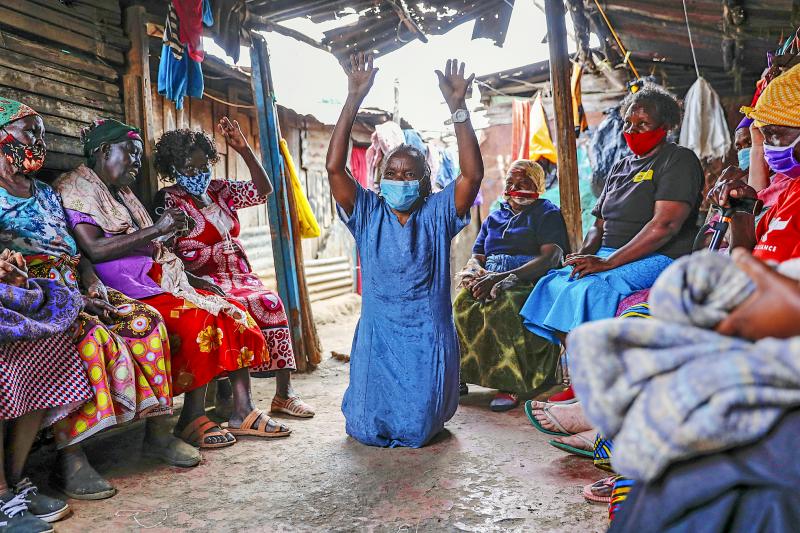In a Nairobi slum named Korogocho, which means “crowded shoulder to shoulder” in Swahili, a group of women navigate raw sewage and sharp metal edges of roofing to attend training they hope might save their lives.
Sexual assault can happen to anyone, and the women are determined to fight back. Aged 60 to more than 90, they meet every Thursday afternoon to practice taekwondo.
Class is serious. Late arrivals are ordered to do sit-ups and jumping jacks as punishment, group chairwoman and lead trainer Jane Waithageni Kimaru said.

Photo: AP
The slum is home to many widows and single mothers. Some have felt especially vulnerable during the COVID-19 pandemic, as Kenyan authorities have reported that cases of sexual violence have risen.
The Kenyan Ministry of Health said it has received reports of at least 5,000 such cases across the nation, often in poor areas.
Officials say in many cases the perpetrators are close to the victims and do not believe the abuse is a crime.
“One day I was attacked by a well-known person who wanted to rape me without protection and I didn’t have good skills to defend myself, I only screamed and the perpetrator ran away,” said one of the women in training, Esther Wambui Mureithi, 72. “If I had good training like now, I could have stabbed his eyes with my fingers and kicked him in his private parts and reported him to a nearby police station.”
Ann Waithera, 76, said she believed that older women have become targets for rape because of the belief that they do not have HIV. She said she has been assaulted many times.
“That made me join this group, which has really helped me to learn how to defend myself and not to fear anyone who attacks me,” she said. “Now I know the skills to shout: ‘No, no, no.’”

ELECTION DISTRACTION? When attention shifted away from the fight against the militants to politics, losses and setbacks in the battlefield increased, an analyst said Recent clashes in Somalia’s semi-autonomous Jubaland region are alarming experts, exposing cracks in the country’s federal system and creating an opening for militant group al-Shabaab to gain ground. Following years of conflict, Somalia is a loose federation of five semi-autonomous member states — Puntland, Jubaland, Galmudug, Hirshabelle and South West — that maintain often fractious relations with the central government in the capital, Mogadishu. However, ahead of elections next year, Somalia has sought to assert control over its member states, which security analysts said has created gaps for al-Shabaab infiltration. Last week, two Somalian soldiers were killed in clashes between pro-government forces and

Ten cheetah cubs held in captivity since birth and destined for international wildlife trade markets have been rescued in Somaliland, a breakaway region of Somalia. They were all in stable condition despite all of them having been undernourished and limping due to being tied in captivity for months, said Laurie Marker, founder of the Cheetah Conservation Fund, which is caring for the cubs. One eight-month-old cub was unable to walk after been tied up for six months, while a five-month-old was “very malnourished [a bag of bones], with sores all over her body and full of botfly maggots which are under the

BRUSHED OFF: An ambassador to Australia previously said that Beijing does not see a reason to apologize for its naval exercises and military maneuvers in international areas China set off alarm bells in New Zealand when it dispatched powerful warships on unprecedented missions in the South Pacific without explanation, military documents showed. Beijing has spent years expanding its reach in the southern Pacific Ocean, courting island nations with new hospitals, freshly paved roads and generous offers of climate aid. However, these diplomatic efforts have increasingly been accompanied by more overt displays of military power. Three Chinese warships sailed the Tasman Sea between Australia and New Zealand in February, the first time such a task group had been sighted in those waters. “We have never seen vessels with this capability

‘NO INTEGRITY’: The chief judge expressed concern over how the sentence would be perceived given that military detention is believed to be easier than civilian prison A military court yesterday sentenced a New Zealand soldier to two years’ detention for attempting to spy for a foreign power. The soldier, whose name has been suppressed, admitted to attempted espionage, accessing a computer system for a dishonest purpose and knowingly possessing an objectionable publication. He was ordered into military detention at Burnham Military Camp near Christchurch and would be dismissed from the New Zealand Defence Force at the end of his sentence. His admission and its acceptance by the court marked the first spying conviction in New Zealand’s history. The soldier would be paid at half his previous rate until his dismissal